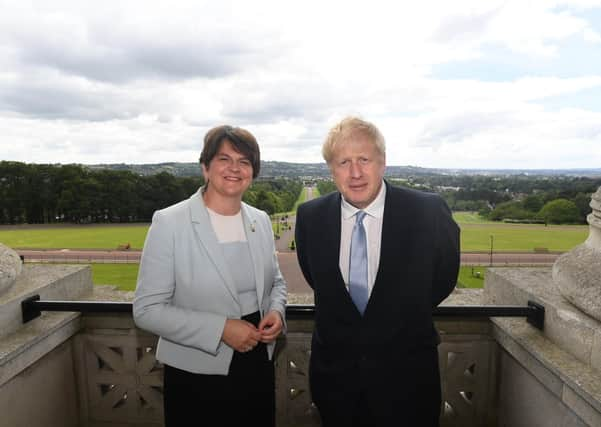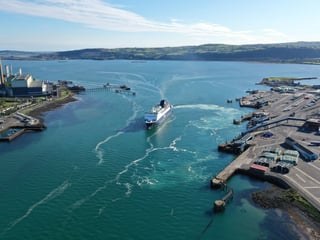Sam McBride: DUP’s constitutional flippancy over Brexit has weakened the Union and been key to Irish Sea Border’s creation


While claiming failure is in fact success provokes derision, leaders appreciate that admitting mistakes reveals their judgement to have been flawed – and they know that in the tribal world of politics their most vociferous supporters will back them almost regardless of their actions.
And so, the default for most politicians is to defend the indefensible until, or often past, the point where that becomes preposterous.
Advertisement
Hide AdAdvertisement
Hide AdHaving backed Brexit for tactical reasons while blind to the strategic risk it was taking, this week the DUP leadership confirmed that it is wholly unrepentant even as one of its ministers suffers the humiliation of seeing the Irish Sea Border posts being constructed by the civil servants to whom he gives orders.
In multiple interviews this week by senior DUP figures there was not a scintilla of regret, not an ounce of self-reflection. From a party which once boasted of its unprecedented power over the government, where there might have been humility, there was pride; in place of embarrassment, there was chutzpah.
The confirmation this week that the Irish Sea Border will start in just 20 days extinguished any lingering hope from those who believed that a year ago Boris Johnson somehow stumbled into signing an agreement which he misunderstood, rather than having betrayed the DUP in a ruthlessly calculated fashion.
While the UK-EU deal this week reduces that border’s burden, and a possible trade deal would further soften the new border, the fact remains that it is nonetheless a new internal UK trade frontier.
Advertisement
Hide AdAdvertisement
Hide AdNorthern Ireland is still a part of the United Kingdom and in a constitutional sense the Union endures. But what Brexit has wrought raises the question of what defines a country. Article VI of the Act of Union more than three centuries ago put in place a trade union alongside political union, stating that the King’s subjects in Ireland and Great Britain were to “be entitled to the same privileges, and be on the same footing...in all ports and places in the united kingdom and its dependencies”.
Internal free trade is one of the defining characteristics of a country, yet here it will be constrained. A situation looms in which, as things stand, it will be unlawful for some British food to be sold in Northern Ireland.
While Parliament and the Crown are nominally still sovereign in Northern Ireland, the de facto position is very different. What is sovereignty if another country – or in this case 27 other countries – can rewrite the laws by which we are bound?
The fact that EU officials will be in Larne and Belfast to enforce the border, as agreed this week, is only a visual manifestation of an unspinnable reality – even without their presence, it would be EU rules over which we will have no democratic say which would be enforced on the EU’s behalf.
Advertisement
Hide AdAdvertisement
Hide AdHaving backed Brexit as something which would lead to a land of milk and honey, the DUP is now reduced not to selling the gains of leaving the EU but attempting to argue that it has helped to mitigate some of the most damaging possibilities.
Senior DUP figures must bitterly regret having not only backed Brexit, but having done so with such zeal that it accepted the then greatest political donation in the history of Northern Irish politics so that it could campaign for Brexit in Great Britain, and then aligned themselves with an ERG suffused with English nationalism.
On Thursday an audibly frustrated Nigel Dodds – who sat on the board of Vote Leave – used an interview with Good Morning Ulster to insist that in backing Brexit “our political strategy has not failed” and criticise the BBC’s questions.
Yet if Lord Dodds had heeded what the BBC was accurately reporting just over a year ago, he may have been able to avoid a move which made it easier for Mr Johnson to get the deal which creates the new border. Last September, Newsnight reported that Mr Johnson was planning for Northern Ireland to be treated very differently to the rest of the UK. But Lord Dodds told Newsnight that he was “quite relaxed about the way things are going” and “I think Boris Johnson knows what he is about” – even though Mr Johnson had openly betrayed the DUP just months earlier.
Advertisement
Hide AdAdvertisement
Hide AdTwo weeks after Newsnight’s revelation, Mr Johnson published his proposed deal for an Irish Sea regulatory border. It spelt out that agri-food goods crossing the Irish Sea from GB would have to go through a “Border Inspection Post...as required by EU law” and “be subject to identity and documentary checks and physical examination”. Similar arrangements would apply to goods due to the province aligning with “all relevant EU rules” in that area.
Given Arlene Foster’s repeated insistence that an Irish Sea border was her “blood red line”, to the surprise of many observers she immediately welcomed the development, saying that “we believe it’s something that works for Northern Ireland”.
What really went on inside the DUP at that point has never been publicly revealed, but it appears that the party believed it was being clever. Mr Johnson’s proposal involved a Stormont vote on the arrangements and the DUP knew – as did the PM – that it had a Stormont veto. But even that logic seemed reckless at the time because devolution was not functioning and it seemed inconceivable that Sinn Féin, which had its own veto on restoring devolution, would have agreed to do so if the DUP was to immediately use that to crush the deal with the EU.
Within three weeks, Mr Johnson had struck his withdrawal deal with the EU and betrayed the DUP. The deal effectively removed the DUP’s veto, instead putting in place a simple majority vote in the Assembly.
Advertisement
Hide AdAdvertisement
Hide AdIn the days after that whirlwind of U-turn and betrayal, Theresa May’s former special adviser on Europe, Raoul Ruparel, told MPs that the DUP support for Mr Johnson’s offer to the EU was “a significant change” from their past opposition to any regulatory divergence and something which crucially “gave the government more leeway to negotiate”. He said that “maybe wasn’t the right choice for them [the DUP]”.
Myriad dangers for unionism, many of them still unknown, stem from how Brexit has unfolded.
If, as now seems likely, the UK decides to maintain EU standards in order to soften the new border, that has the potential to anger Brexiteers and others with an interest in altering those standards. Wasn’t Brexit about taking back control, after all?
If Northern Ireland, rather than Brussels, is now the impediment to that control being exercised, the anger once directed at continental bureaucrats could be channelled towards Northern Ireland.
Advertisement
Hide AdAdvertisement
Hide AdOn Wednesday, a fence-sitting DUP statement said: “We will want to ensure that regardless of wider circumstances there continues to be full-unfettered access for our businesses to the lucrative GB marketplace.” Yet participating in a market involves trade in two directions. Even the supposedly “unfettered” ability for Northern Ireland firms to sell to GB is more complex than it first appears.
This week a senior freight industry figure explained how local manufacturers benefit significantly from lorries coming into Northern Ireland with goods from GB, because they are returning anyway. Disrupting one route necessarily disturbs the other.
Borders are complex but in Northern Ireland it might have been expected that politicians would have an intuitive understanding of their significance.
Instead, eight months after the vote for Brexit the then DUP MLA Nelson McCausland told the Nolan Show during a discussion about border arrangements: “I wouldn’t care what sort of situation I face as long as I’m out of Europe.”
Advertisement
Hide AdAdvertisement
Hide AdThat glib comment summed up the constitutional flippancy of some senior DUP figures who were wallowing in simplistic nationalistic fervour, while ignorant of the complexity of the changes they were proposing and the fragility of the Union with which they were tampering.
The DUP now likes to point to the absurdity of Mr Johnson’s position but its own refusal to accept its multiple mistakes is as unconvincing as the prime minister’s denial that there will even be an Irish Sea Border.
_____ __________
_____
A message from the Editor:
Thank you for reading this story on our website. While I have your attention, I also have an important request to make of you.
With the coronavirus lockdown having a major impact on many of our advertisers — and consequently the revenue we receive — we are more reliant than ever on you taking out a digital subscription.
Advertisement
Hide AdAdvertisement
Hide AdSubscribe to newsletter.co.uk and enjoy unlimited access to the best Northern Ireland and UK news and information online and on our app. With a digital subscription, you can read more than 5 articles, see fewer ads, enjoy faster load times, and get access to exclusive newsletters and content. Visit https://www.newsletter.co.uk/subscriptions now to sign up.
Our journalism costs money and we rely on advertising, print and digital revenues to help to support them. By supporting us, we are able to support you in providing trusted, fact-checked content for this website.
Alistair Bushe
Editor
